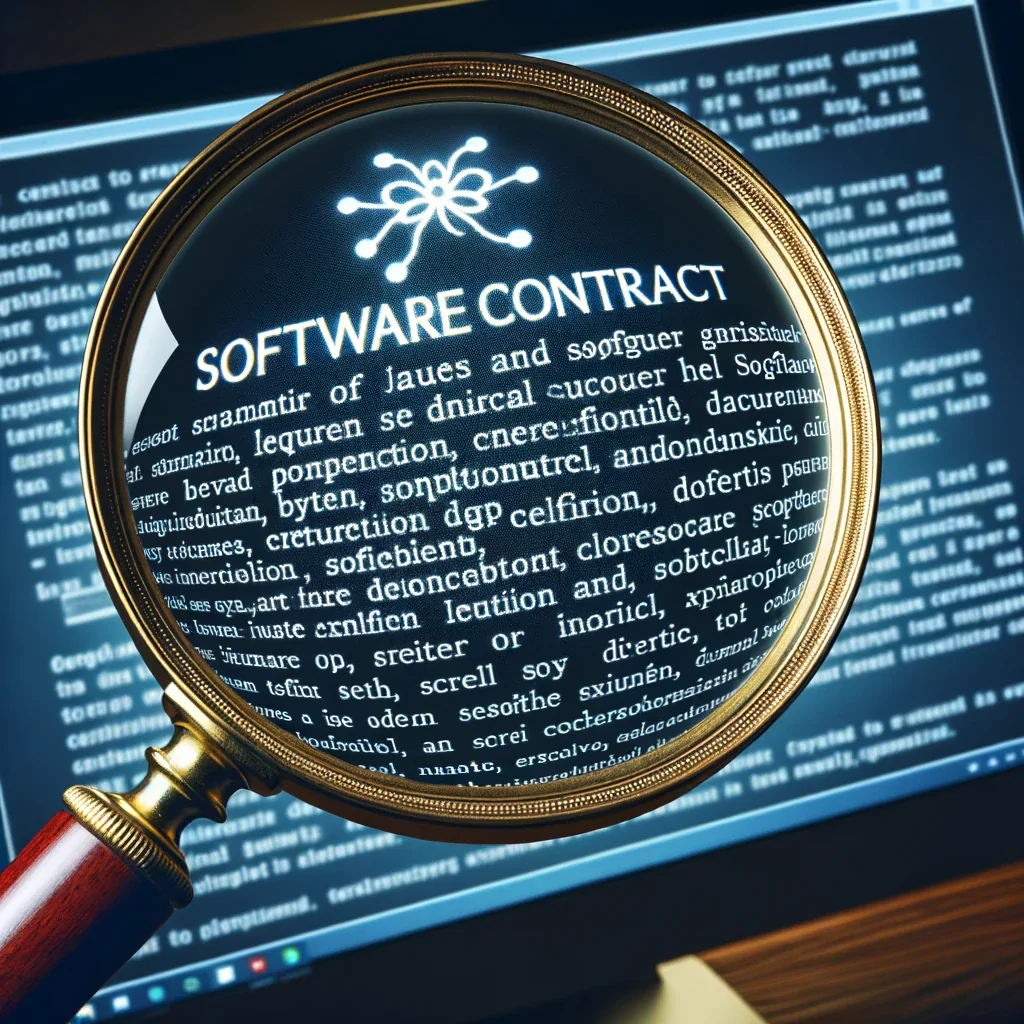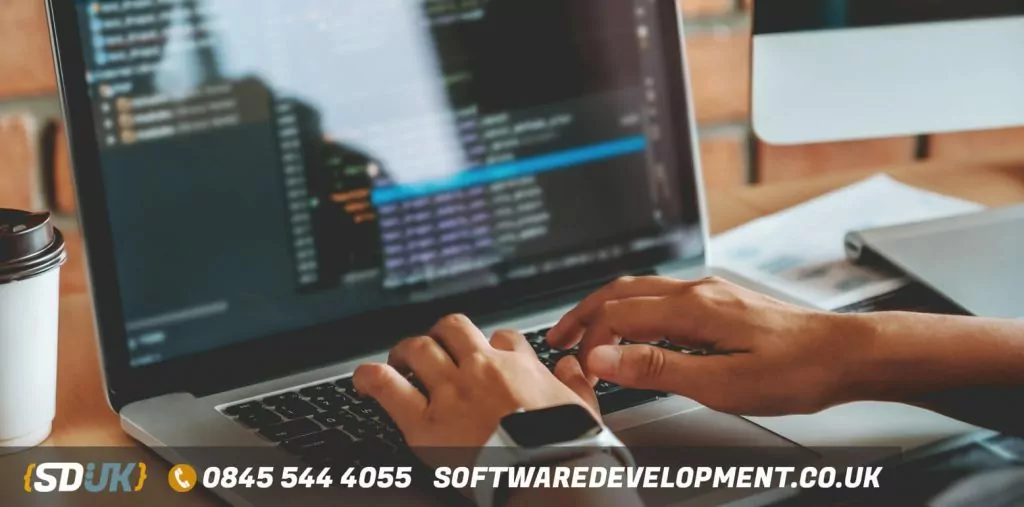A Software Development Contract serves as more than just a legal formality; it’s a comprehensive guide that outlines the responsibilities, expectations, and legal obligations of both parties involved.
Neglecting this critical step or cutting corners in drafting a Software Development Contract can lead to a cascade of severe consequences that go beyond mere legal formalities. A poorly drafted contract can sow the seeds of misunderstandings between the client and the development team, leading to delays, compromised quality, and even project failure. Such misunderstandings can escalate into legal disputes that not only consume time and money but also tarnish reputations. Financial losses incurred from these disputes can be substantial and may even threaten the viability of the project or the company itself.
Without clear clauses on ownership and data protection, you may inadvertently expose sensitive business secrets or lose control over your own software. Therefore, it’s not just advisable but imperative to invest adequate time and resources into creating a thorough, legally sound contract. This will not only safeguard your interests but also lay the foundation for a successful, collaborative project outcome.
Related Read: How To Choose A Good Software Development Company?

TL;DR: Key Take aways
This article serves as your go-to guide for Software Development Contracts under English Law. Here’s what you need to know in a nutshell:
- Essential Elements: Scope, payment terms, and intellectual property rights are must-haves.
- Choosing a Company: Look for experience, reviews, and technology stack.
- Contract Types: Fixed-price contracts are generally safer but less flexible.
- Key Areas: Focus on deliverables, timelines, and penalties for non-compliance.
- Duration and Cost: It takes 2-4 weeks and costs around £3,000 to draft a contract.
- Legal Expertise: A specialised solicitor can save you from future legal hassles.
- Contract Originality: Use a Google search trick to verify the contract’s uniqueness.
These takeaways offer a quick snapshot of the essential information you’ll find in the article.
What are the key components of a software development contract?
Provided below is a high-level overview of the key components of a software development contract:
- Scope of Work
The scope of work is the cornerstone of the contract. It should be meticulously crafted to include not only the project’s objectives but also the specific requirements, methodologies, and technologies to be used. The contract should also address the process for making changes to the software requirements after the agreement is signed. - Payment Terms
Payment terms should cover not just the amount and schedule but also the currency, payment methods, and any conditions that might trigger additional charges or penalties. This ensures financial transparency and helps in budget planning. - Intellectual Property Rights and Licensing
This section should clearly define the intellectual property rights existing in the software, whether it will be open-source, and any third-party licenses required. It should also specify the licensing model to be used and what will be included or excluded from the license. - Confidentiality and Data Protection
Confidentiality clauses should cover not only non-disclosure but also data protection and compliance with regulations such as GDPR. Both parties should be clear on what constitutes confidential information and the penalties for breaches. - Software Installation and Integration
The contract should specify which party will be responsible for the installation, configuration, and integration of the software. It should also outline how technical challenges arising from this process will be dealt with and paid for. - Warranties and Indemnities
This section should include specific warranties regarding the software’s performance, stability, or security and indemnities against damages or losses. - Support Services
If the development firm offers continued support, this should be detailed in the contract, including the scope of support services, the medium through which they will be provided, and any limitations. - Training and Consulting
The contract may also provide for training and consultancy services, specifying whether the scope of these services will be defined at the outset or subject to a later agreement. - Contract Variation and Change
The contract should outline the procedures for making changes to the software specification or the contract itself. - Termination Clauses
Termination clauses should be comprehensive, covering not just breach of contract but also scenarios like insolvency or changes in business strategy. They should outline the notice period, responsibilities, and any costs associated with early termination. - Dispute Resolution
The contract should specify the methods for resolving any disputes, such as mediation or expert determination.
By being thorough in these key areas, you lay the groundwork for a successful software development project, mitigating risks and ensuring a harmonious collaboration.
How Long Does It Take to Get a Software Development Contract Drawn Up?
The time it takes to draft a Software Development Contract can vary, but it generally takes between two to four weeks.
The creation of the software contract is the responsibility of the software house (the provider). The duration for drafting a Software Development Contract depends on various factors such as the complexity of the project, the number of parties involved, and the specific legal requirements. It’s essential to allocate sufficient time for this process to ensure that all aspects are thoroughly covered.
📊 Time Allocation Table
The following table provides a rough estimate of the time you should allocate to each section of the contract drafting process under English Law:
| Phase | Time Allocation | Description |
| Initial Drafting | 1 week | Initial draft by the legal team |
| Legal Consultation | 3-5 days | Review by specialists in software contracts |
| Revisions | 1 week | Iterative revisions involving legal teams, project managers, and tech leads |
| Due Diligence | 2-3 days | Verification of the software house’s credentials |
| Final Approvals | 3-5 days | Final review and sign-off |
NOTE: The client upon receiving the contract will be required to have their solicitor review the contract on their behalf.
The table outlines the key phases in the contract drafting process and the time typically allocated to each. Due diligence, especially in verifying the software house’s credentials, is an essential step in this process.

How Long Should You Spend Reviewing a Software Development Contract?
For a client, the review and sign-off process for a Software Development Contract typically takes one to two weeks.
The time required for a client to review and sign off on a Software Development Contract can vary based on several factors. These include the complexity of the contract, the need for external legal consultation, and the speed at which revisions can be made and approved.
📊 Client Review Time Allocation Table
Here’s a rough breakdown of the time allocation from the client’s perspective:
| Phase | Time Allocation | Description |
| Initial Review | 1-3 days | First pass review by the client’s legal and project teams |
| External Legal Review | 2-5 days | Detailed review by external legal experts specialising in software contracts |
| Revisions & Clarifications | 1-3 days | Time for asking questions, seeking clarifications, and making minor revisions |
| Final Review & Sign-off | 1-3 days | Final review by key stakeholders and formal sign-off |
The table outlines the typical time frames for each phase of the client’s review process. The process may also involve several rounds of revisions and clarifications, making it crucial to allocate sufficient time for a thorough review.
How Much Does a Software Development Contract Cost?
The cost of a Software Development Contract can range from £2,000 to £4,000, depending on various factors such as legal expertise required, complexity, and the number of revisions.
The cost of drafting a Software Development Contract isn’t just a flat fee; it’s influenced by several variables. These can include the complexity of the software being developed, the number of stakeholders involved, and the level of legal expertise required. It’s crucial to budget adequately for this to avoid any surprises down the line.
Here’s a breakdown of the potential costs involved in drafting a Software Development Contract under English Law:
| Item | Estimated Cost (£) | Description |
| Legal Consultation | 500 – 1,000 | Fees for consulting with legal experts specialising in software contracts |
| Initial Drafting | 1,000 – 2,000 | Cost for the initial draft by a legal team |
| Revisions | 300 – 500 | Fees for any revisions and amendments |
| Due Diligence | 200 – 300 | Costs for verifying the credentials of the software house |
| Final Review & Sign-off | 100 – 200 | Final review and administrative costs |
The table provides an estimated cost breakdown for each phase of the contract drafting process. It’s advisable to consult with legal experts who specialise in software contracts to ensure that the contract is both comprehensive and compliant. Due diligence, especially in verifying the software house’s credentials, is an essential step in this process.
What Are the Key Areas to Focus on in a Software Development Contract?
The three key areas to focus on in a Software Development Contract are Intellectual Property Rights, Payment Terms, and Dispute Resolution.
When drafting or reviewing a Software Development Contract, it’s crucial to pay special attention to certain areas that could significantly impact both parties involved. These areas often require intricate detailing and can be the make-or-break factors in a successful partnership.
Here’s a table that outlines these three key areas under English Law:
| Key Area | Importance Level | Description |
| Intellectual Property Rights | High | Defines who owns the code, assets, and other intellectual properties. |
| Payment Terms | High | Outlines the payment schedule, milestones, and conditions for additional costs. |
| Dispute Resolution | Medium | Specifies the methods for resolving disagreements, such as arbitration or legal proceedings. |
The table highlights the importance level and provides a brief description of each key area. Intellectual Property Rights are often the most contentious and thus require meticulous detailing. Payment Terms need to be transparent and fair to both parties to ensure a smooth working relationship. Dispute Resolution mechanisms should be in place to handle any disagreements or issues that may arise during the project.

How to Choose a Reliable Software Development Company?
Choosing a reliable Software Development Company is vital for the success of your project. Look for a company with a proven track record, technical expertise, and transparent communication.
Selecting the right Software Development Company can make or break your project. Here are some key factors to consider:
📋 Checklist for Choosing a Software Development Company
| Factor | Description |
| Track Record | Check the company’s past projects and client testimonials. |
| Technical Expertise | Ensure they have the skills needed for your specific project. |
| Communication | Assess how well they communicate, as this is crucial for project success. |
| Budget | Make sure their pricing aligns with your budget without compromising quality. |
| Legal Compliance | Verify that they adhere to software laws and regulations, especially under English Law. |
This checklist serves as a starting point for evaluating potential software development companies. It’s crucial to conduct thorough research and perhaps even consult a software legal expert to ensure you’re making an informed decision.
Which Type of Contract Suits Software Development?
The type of contract best suited for software development largely depends on the project’s scope, complexity, and specific requirements. Fixed-price, time-and-materials, and retainer contracts are commonly used.
Choosing the right type of contract is crucial for the smooth execution of a software development project. Here are some commonly used contract types and their applicability:
📊 Types of Software Development Contracts
| Contract Type | Best For |
| Fixed-Price | Projects with well-defined requirements and scope. |
| Time-and-Materials | Projects that are complex and may require changes mid-way. |
| Retainer | Long-term projects requiring ongoing maintenance and support. |
- Fixed-Price: This type of contract is ideal for projects where the scope, timeline, and project requirements are clearly defined. It offers financial predictability but is less flexible for changes.
- Time-and-Materials: This is suitable for projects where the scope is not clearly defined and changes are expected. It offers flexibility but may go over budget.
- Retainer: This is a long-term agreement that’s beneficial for projects requiring ongoing work. It provides a balance of flexibility and predictability.
Each contract type has its pros and cons, and the best choice will depend on the specific needs of your software development project. Consulting a legal expert familiar with software contracts under English Law can provide valuable insights into making the right choice.

Need Expert Guidance?
We provide fully managed end-to-end solutions for operators and service companies needing expert guidance.
Take advantage of our unique {SD:UK} CTO as a Service solution. Our experts help you to formally capture requirements, create a system specification and then fully manage the implementation of your project for a successfull delivery.


Why Use a Specialised Solicitor?
Utilising a specialised solicitor for your Software Development Contract is essential for ensuring that the contract is legally sound, comprehensive, and tailored to your specific needs under English Law.
Opting for a specialised solicitor for software contracts offers several advantages:
- Expertise in Software Law: Specialised solicitors have a deep understanding of the nuances in software law, including intellectual property rights, data protection, and compliance with English Law.
- Risk Mitigation: They can identify and address potential legal pitfalls that could otherwise lead to costly disputes or litigation.
- Customisation: A specialised solicitor can draft a contract that is tailored to the unique requirements of your software project, as opposed to generic, off-the-shelf contracts.
- Negotiation Skills: Their expertise enables them to negotiate favourable terms, ensuring that your interests are well-protected.
- Time Efficiency: With their experience, specialised solicitors can expedite the contract drafting and review process, saving you valuable time.
Top Tip: Verifying Contract Originality
It’s crucial to verify the originality of your Software Development Contract to ensure it’s not a generic template. This can be a sign of the software company’s commitment to due diligence and legal integrity.
To ascertain the originality of your Software Development Contract, consider the following steps:
- Text Search: Copy a clause word-for-word and search for it in quotes on Google. If multiple websites have the same content, it’s likely a generic template.
- Legal Jargon: Look for legal terms and clauses that are specific to your project or industry. Generic contracts often use broad and non-specific language.
- Consult a Specialised Solicitor: They can quickly identify if the contract is a standard template or if it has been customised to fit your specific needs.
- Ask for the Contract’s Origin: Don’t hesitate to ask the software company about the origins of the contract. A trustworthy company should be transparent about this.
- Cost of Contract: As a rule of thumb, a custom-drafted contract by a specialised solicitor can cost between £2,000 and £4,000. Anything less might be a red flag for a generic contract.
Verifying the originality of your Software Development Contract is not just a procedural step; it’s a critical measure of the software company’s professionalism and your own legal security.
Are You Ready to Sign?
Before putting pen to paper, ensure you’ve thoroughly reviewed and understood every aspect of the Software Development Contract. This is the final step in a journey that requires due diligence, legal advice, and a deep understanding of your project’s needs.
Signing a Software Development Contract is a significant commitment that goes beyond legal formalities. Here are some final considerations:
- Comprehensive Review: Make sure you’ve read and understood all clauses, terms, and conditions. Any ambiguity can lead to complications down the line.
- Legal Counsel: If you haven’t already, consult a specialised solicitor to review the contract’s legality and fairness.
- Negotiation: Remember, a contract is not set in stone until signed. If there are terms you’re uncomfortable with, negotiate.
- Future Planning: Consider the long-term implications of the contract, including support, maintenance, and potential exit strategies.
- Trust and Transparency: Ensure that both parties are clear about their responsibilities and expectations to foster a successful partnership.
Signing a Software Development Contract is not just a transaction; it’s the beginning of a partnership. Make sure you’re entering this relationship with open eyes, a clear understanding, and a commitment to mutual success.
Further reading:
To expand your knowledge and understanding of Software Development Contracts, consider diving into the following resources:
- “Software Agreements Line by Line” by Michael Overly and James Kalyvas
- “A Legal Guide to Software Contracts” by Mark Grossman
- “The Tech Contracts Handbook” by David W. Tollen
Frequently Asked Questions
An NDA is a legal contract that protects sensitive information shared between the client and the software development company. It’s often signed before the main contract.
Yes, you can outsource software development to companies located in other countries. However, be cautious about legal jurisdictions and quality standards.
Agile is a project management and product development approach that is flexible and collaborative. It often requires special contractual considerations.
You can protect your source code through intellectual property clauses in your contract and by using source code escrow services.
A ‘Time and Material’ contract bills the client based on the actual time and resources spent on the project, offering flexibility but less predictability in costs.
A ‘Fixed-Price’ contract sets a predetermined price for the project, offering cost predictability but less flexibility in scope changes.
Milestones are specific goals or deliverables set at various stages of the project. They often come with payment schedules in the contract.
An SLA outlines the expected level of service from the software development company, including response times, resolution times, and uptime guarantees.

